-
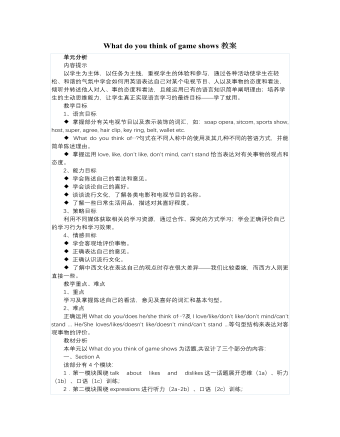
人教版新目标初中英语七年级下册What do you think of game shows教案
五、教学Section B-2c1. Pair work: What do you think of the belt/sunglasses/…? What does your father/mother/… think of your scarf/belt…?2. Group work(1). Teacher shows some different kinds of school uniforms (制服)and asks : “ What do you think of your school uniforms? If you have a chance to choose your school uniforms, what kind would you like to choose?”(2). Discuss in groups.(3).Get some Ss to report in class.说明:这一步旨在让学生运用已有的语言知识谈论对事物的看法和意见,并简单阐明理由,培养学生的主动思维能力和运用英语的能力。六、教学拓展调查电视节目的收视率任务:调查你周围的人对现在各种电视节目的反响。活动过程:1.教师布置任务,让学生调查周围的人(包括他的亲戚朋友和邻居)喜欢收看哪方面的电视节目。2.学生进行调查活动,运用本单元所学的句型What do you think of….? (Why?)What's your favorite game shows?What do you think of talk show?I doesn’t mind it.I like it.I love it.I can’t stand it.3.记录下排在前10位的TV Program,填写调查表,比较其收视率。
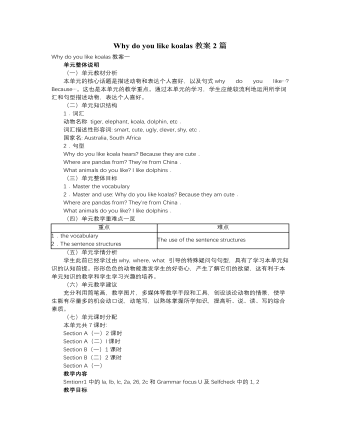
人教版新目标初中英语七年级下册Why do you like koalas教案2篇
单元整体说明(一)单元教材分析本单元的核心话题是描述动物和表达个人喜好,以及句式why do you like…? Because…。这也是本单元的教学重点。通过本单元的学习,学生应能较流利地运用所学词汇和句型描述动物,表达个人喜好。(二)单元知识结构1.词汇动物名称 tiger, elephant, koala, dolphin, etc.词汇描述性形容词: smart, cute, ugly, clever, shy, etc.国家名: Australia, South Africa2.句型Why do you like koala hears? Because they are cute.Where are pandas from? They're from China.What animals do you like? I like dolphins.(三)单元整体目标1.Master the vocabulary2.Master and use: Why do you like koalas? Because they am cute.Where are pandas from? They're from China.What animals do you like? I like dolphins.(四)单元教学重难点一览(五)单元学情分析学生此前已经学过由why, where, what 引导的特殊疑问句句型,具有了学习本单元知识的认知前提。形形色色的动物能激发学生的好奇心,产生了解它们的欲望,这有利于本单元知识的教学和学生学习兴趣的培养。

人教版新目标初中英语八年级上册Could you please clean your room教案3篇
一、 教学内容Section A 1a----1c二、 教学目标1.学习词汇do the dishes, make the bed, take out the trash, fold the clothes, do the laundry, sweep the floor, clean the living room.2.句型 Could you please clean your room? Yes, sure.三、 教学准备 学生预习本单元所有的词汇多媒体课件 活动表 奖品四、 教学过程Pre-task1. Warming upEnjoy ourselves. Watch cartoon Cinderella. 看动画片段《灰姑娘》导如入本课话题和新词汇“chores”美丽善良的鬼姑娘因继母的嫉妒,每天得做所有的家务。片段的主题使学生联想到本课的话题。2. learn new words and phrasesLook! What is she / he dong? 看图学习动词词组do chores, do the dishes, make the bed, take out the trash, fold the clothes, do the laundry, clean the living room.3. Guessing game.What is she doing ? 4. Pair work. 1a, Do you do these things at home? Write “Y” for “yes” and “N” for “no”.5. Listening . 1b , Peter’s chores or Mom’s chores?理解目标语Could you please clean your room? Yes, sure.Write “M” for Mom’s chores, “P” for Peter’s chores in the chart.6. PairworkLook at the picture,Ask your partner to do the chores that you see. 7. Interview Who is the most able at home? 1) What chores do you do at home? How often do you do the chores? Work in four, interview each of the students in the group, fill in the chart.

人教版新目标初中英语八年级上册What are you doing for vacation教案2篇
Teaching goals : 1. Words & phrases: babysit ,get back , fishing , rent , think about , decide(on) , tourist etc. 2. How to talk about future plans . 3. 现在进行时表示将来计划或行动. 4. 特殊疑问句(where , when , how long引导) Important and difficult points : Drills :What are you doing for vacation ? I’m watching TV . When are you going ? I’m going … . How long are you staying ? We’re staying for five days . Teaching aids : cards and a tape ,a large wall calendar . Period 1 Teaching procedures : Step 1Leading in1. Free talk . 2. Put up the wall calendar . T: I’m staying home on Saturday (pointing to next Saturday ).Ss repeat . Ss: I’m staying home on Saturday . T: OK. Today we’ll learn how to talk about future plans. Step 2Pre-task SB Page 13 , 1a . 1. Look at the picture carefully and tell what you see in the picture . 2. Write the activities from the pictures in the box and add some more . 3. Practice reading . Step 3While-task1. Using the activities we write in 1a to make conversations .For example :What are you doing for vacation ? I’m visiting my uncle . 2. Pairwork .Practice in pairs . 3. 用第三人称练习对话.
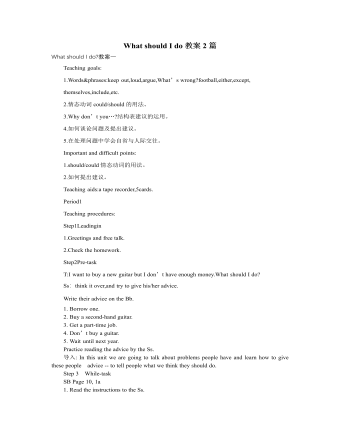
人教版新目标初中英语八年级下册What should I do教案2篇
说明:在帮Li Lei提建议的同时,教育学生如何学好英语。第三课时教学目标1. 语言目标:a) 词汇: Original, in style, haircut, the same as.b) 语言结构:My friend wears the same clothes and has the same haircut as I do.2. 能力目标:大多数学生能够谈论自己喜欢哪种服装,提高查找信息的能力。3. 情感目标:学会如何与朋友相处,要有自己对时尚的看法。教学重点掌握一些重要词汇。教学难点学会谈论问题,并能提出书面建议。◆教学突破首先针对Erin的问题,提出个人的建议,模仿2c部分的对话展开双人交际Pair-work;听老师诵读3a部分的信件,并找出LEFT OUT的问题所在;学生完成3b部分的内容,给Left Out提出书面的建议;学以口头形式提出自己目前存在的某个问题,讲给大家听,让同学们给自己提出一个建议,并作笔录;学生两、三个人分成一组,随意性地进行口语交际,谈论P14的第4部分的某个问题,相互交换意见。
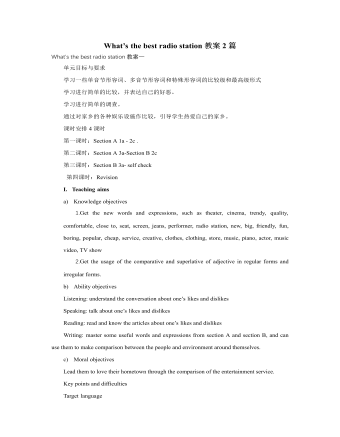
人教版新目标初中英语八年级上册What’s the best radio station教案2篇
教学重点和难点:运用所掌握的语言描述,比较不同地点的特点。在练习中学习掌握英语比较级和最高级的用法。课前准备分配小组,每组五至六人。通过上网或翻阅报刊杂志等方法,确定旅游线路,做出基本的旅游计划。教学设计:本节课流程图 学法指导:1.由于这是一堂新课,在教学中应注意面向全体,发挥学生的主体性,引导学生积极参与,激发学生的求知欲和学习积极性,指导学生积极思维,主动获取知识,养成良好的学习方法。逐步学会独立解决问题。总之要尽可能调动学生的非智力因素促进智力因素的发展。教法选择:1.电化教学法2.课堂讨论法3.任务型教学法采用这些方法的目的是为了充分调动学生的学习积极性,使学生变被动学习为主动学习。通过电脑形象的演示,加强印象,提高兴趣,突破难点,提高教学效率,进而增大教学的容量和信息量。充分体现教师为主导,学生为主体的教学原则。

人教版新目标初中英语八年级下册He said I was hard-working教案2篇
This activity introduces some new vocabulary and provide oral practice using the target language.Task 1 . Ask four students to stand in front of the class, and the teacher asks them the following questions as a reporter.1.What are you going to do when you grow up?2.What are you going to do next week?3.What are going to do after school?The students will give different answers, then ask a good student to report what they said.I am going to e a doctor.What did she say?----------She said she was going to be a doctor.I am going to have a party on Friday night.What did he say?-------He said he was going to have a party on Friday night.I am going to do my homework.What did she say ?------ She said she was going to do her homework.I am going home after school.What did she say?-----She said she was going home after school.Say In this unit we are going to learn to use words like to report what someone said.Task 2. Read the instructions. Then ask a student to read the four questions. And write the words on the Bb. Explain what soap opera is.Task 3. Ask the students to Look at the pictures, point out the TV screens in the picture. Ask one girl to read what Marcia said.What did Marcia say? She said She said she was having a surprise party for Lana on Friday night. Repeat the other pictures in the same way.Activity3. Listen and number the pictures in activity 1a.

人教版新目标初中英语八年级下册What were you doing when the UFO arrived教案2篇
(一).知识方面: 1.培养学生能运用过去进行时来描述、谈论过去某个时间正在发生的事情或动作的意识和能力,能就过去某个时间正在发生的动作做出正确的描述。 2.培养学生的想象力和角色扮演的合作能力。 3.培养学生讲述过去发生的事情经过的能力。能正确运用一般过去时来讲述故事。 (二).技能方面: 1.本单元的语言目标是Talk about past events and tell a story(谈论过去的时间和讲述一个故事),围绕这一目标,要涉及句型: What were you doing when the UFO arrived? ----I was sitting in the barber’s chair. The barber was cutting my hair. 因此必须学习standing、studying、cleaning、sleeping、cooking、making、eating、cutting、等表示地点的词,以便为上述句型提供语言材料。2.学习过去进行时的有关知识。Was/were+现在分词,是该时态的表达式。 3.在学习过程中,要区分The boy was walking down the street when the UFO landed.和While the boy was walking down the street, the UFO landed.这两种由when和while引导的状语从句的句型结构。注意它们的不同。
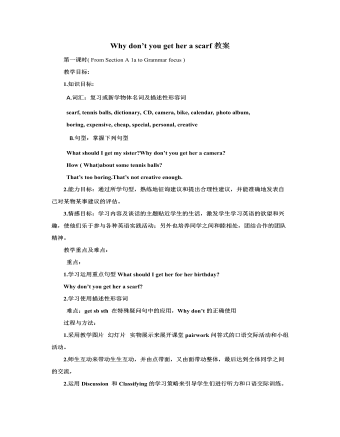
人教版新目标初中英语八年级下册Why don’t you get her a scarf教案
教师带领学生复习有关描述宠物的词汇,采用教师提问学生回答的方进行。如:T:What animals do you think would be good pets?What animals do you think would be bad pets?What do you think are good animals for a six-year-old child?然后学生进行 pairwork 练习。Task two: 师生互动,学习探究 1、播放3a部分的录音,引导学生一边听录音,一边跟读。2、通过听录音学生回答以下问题:Why do you think pot-bellied pigs are popular?What are the advantages and disadvantages of keeping such a pet?教师对学生的回答进行及时点评。3.学习范文,学习重点短语,为下步的模仿写作提供语言素材。T :1. )Have you ever kept a pig as a pet?Do you like pigs? St.:No.…Why don’t you like to keep a pig? St: No.They’re too dirty and lazy(Do you know in some foreign countries like Hollyland, Australia,pigs are the most popular pet.there’s a kind of pig.(图)it has an interesting name? it ‘s called a pot-bellied pig.) Now,let’s learn an article about this kind of interesting pet.2.)play the tapeSt.:Listen and repeat3.)show some Qs on computer(本子St.: read silently,then answerthe Qs(本子)4.)Ask ss. Close book and retell this passage.(what is a pot-bellied pig? Is it a good or bad pet? ) St.: retell it to each other“A pot –bellied pig is a popular pet now…”5.read the article together.St.:.practice reading

人教版新目标初中英语九年级上册Teenagers should be allowed to choose their own clothes教案2篇
Step 1 Greeting Greet the class and check the homeworkStep 2 A duty report The S on duty gives a report on the rules in his home and lead in 3a “Sun Fei’s and Wu Yu’s rules” Step 3 ReadingSs read the conversation and write the two girls’ rules in the chart. Check the answers.Get Ss to read after the tape and then read aloud by themselves. Then, T explains the language points.Step 4 Pairwork 3bRole play. Use the information in chart to practice with the conversation in 3a covered. They can look at the sample conversation in the right box.Step 5 Task 2 “Who’s the best reporter?”Make a survey by asking any 5 students the questions in the chart in activity 4. Then give out a report about it. See who is the best reporter? And the best reporter will get a nice ball-pen.Step 6 Summary and homework:Write out the report in your exercise-books.Period ThreeStep 1 Greeting and a duty reportThe S gives a duty report talking about his experience of being late for school. Lead in the question “Do you ever get to school late? How often do you get to school late? Always, usually, sometimes, or never?Step 2 1a Get Ss to finish writing.Step 3 Pairwork 1b Get Ss to talk about their answers with their partners using the sample conversation in the box on the right.Step 4 Listening practice2a Lead-in: What will happen if you get to school late? What about Peter? Let’s listen to a conversation between Peter and his father. Get Ss to finish 2a (As usual, for the first time, Ss only listen.) Check the answers.

人教版新目标初中英语九年级下册By the time I got outside, the bus had already left教案
Ⅰ. Teaching Aims and Demands1. Knowledge Objects(1) Key Vocabularyoversleep(2) Target LanguageWhat happened?I overslept. And by the time I got up, my brother had already gotten in the shower.2. Ability Objects(1) Teach the students to use the new words.(2) Train the students to narrate past events with the Past Perfect Tense.(3) Train the students' listening and speaking skills with the target language.3. Moral ObjectIt’s a good habit to go to bed early in the evening and get up early in the morning. So you’ll never be in a hurry in the morning.Ⅱ. Teaching Key Points1. Key Vocabularyoversleep2. Target LanguageNarrate past events with the Past Perfect TenseⅢ. Teaching Difficult Points1. Train the students to narrate past events with the Past Perfect Tense.2. Train the students to understand the target language in spoken conversation.Ⅳ. Teaching Methods1. Thinking of examples from the students' real lives.2. Making sentences by looking at the pictures.Ⅴ. Teaching AidA tape recorderⅥ. Teaching ProceduresStep I Revision1. Revise the language points in Unit 8.Ask some questions like this: What volunteer work would you like to do?Help the students to answer, I’d like to…/I love to…/I hope to2. Practice the dialogue in Activity 3c on page 62 again. Get students to role play the similar dialogues with the following.

人教版新目标初中英语九年级下册Rainy days make me sad教案
1. 教材分析本单元以how do things affect you?为话题, 从颜色、天气、音乐、广告、产品等方面谈论了外界事物如何影响人的心情。要求学生掌握表达某物或某事给人带来的感觉、看法或影响等。共设计了四个部分的内容:Section A 该部分有4个模块:第一模块围绕Which restaurant would you like to go to?这一话题展开思维(1a)、听力(1b)、口语(1c)训练;第二模块围绕How does music affect you? 进行听力(2a-2b)、口语训练(2c);第三模块继续围绕how do colors in the restaurant affect you这一话题展开训练,训练形式为阅读和问题体验(3a)和小组活动(3b);第四模块仍就How do things affect you这一话题以调查的形式展开讨论。Section B该部分有4个模块:第一模块围绕产品广告对人们的影响这一话题以“配对”(1a)与“列举”(1b)两种形式展开训练;第二模块继续围绕How do things affect you? 进行听力(2a-2b)、口语对话训练(2c);第三模块围绕“Advertising”这一话题展开阅读(3a-3b)和写作(3c)训练;第四模块围绕How posters affect you这一话题以口语训练形式展开小组活动。

人教版新目标初中英语九年级下册We’re trying to save the manatees教案2篇
本单元主要围绕着有关濒临灭绝的动物这一话题,学习了应该怎样保护我们的环境,以及就某一问题展开辩论。目标提示语言目标能够运用所学知识,就某一问题展开辩论。认知目标1、复习一些语法:现在进行时、一般现在时、用used to 表示一般过去时、现在完成时、一般过去时的被动语态。2、学会表达同意和不同意。3、学会以下基本句型:We’re trying to save the manatees.Manatees eat about 100 pounds of food a day.There used to be a lot of manatees.In 1972,it was discovered that they were endangered.Some of the swamps have become polluted.情感目标了解一些濒临灭绝的动物的生活习性和濒临灭绝的原因,教育学生应该如何保护环境。教学提示充分利用多媒体等教学设备,创设与本课话题相关的情境,如各种不同种类的动物、动物园以及有关环境的画画等等。围绕着本单元的教学目标,设计一些贴近学生实际的教学任务,如让学生谈论自己最喜欢的动物,如何拯救濒危动物,如何保护环境等等。让学生根据所学知识,就动物园是否对动物有利以及其他的话题进行辩论。

人教版新目标初中英语九年级下册You’re supposed to shake hands教案
教学目标:1. 掌握本单元一些重点词汇的写法和用法。2. 学会自如谈论餐桌礼仪。Step 1 RevisionAsk some students to retell the customs at the table in France in the passage in 3a.Step 2 Self checkPart 1. Fill in each bland with the correct word given. Students do the exercises by themselves at first. Then check the answers. Ask the students to comprehend the sentences and help them point out uses of some words, like “arrive (at / in) sw., spend time / money on sth , spend time / money (in) doing sth.”Part 2. Read about Fan Ling’s experience in a western restaurant. Understand the passage. Point out some key points in the passage.1. be / get used to doing sth. 习惯做某事2. begin with = start with 以….开头3. crowd v. 挤满,塞满 the crowd 人群 crowded adj. 拥挤的Then students discuss about how she would solve her problem. Ask some to share their stories with others.Part 3. Complete the crossword by looking at the sentences on the left. Then check the answers.
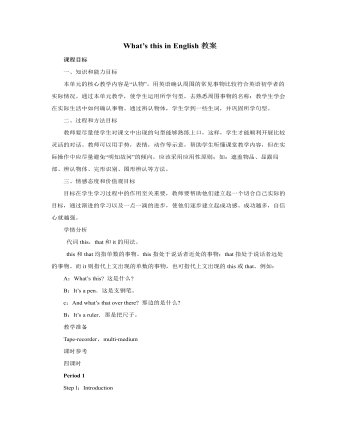
人教版新目标初中英语七年级上册What’s this in English教案
一、知识和能力目标本单元的核心教学内容是“认物”。用英语确认周围的常见事物比较符合英语初学者的实际情况。通过本单元教学,使学生运用所学句型,去熟悉周围事物的名称;教学生学会在实际生活中如何确认事物。通过辨认物体,学生学到一些生词,并巩固所学句型。二、过程和方法目标教师要尽量使学生对课文中出现的句型能够熟练上口,这样,学生才能顺利开展比较灵活的对话。教师可以用手势,表情,动作等示意,帮助学生听懂课堂教学内容,但在实际操作中应尽量避免“明知故问”的倾向,应该采用应用性原则;如:遮盖物品、显露局部、辨认物体、完形识别、图形辨认等方法。三、情感态度和价值观目标目标在学生学习过程中的作用至关重要,教师要帮助他们建立起一个切合自己实际的目标,通过渐进的学习以及一点一滴的进步,使他们逐步建立起成功感。成功越多,自信心就越强。

人教版新目标初中英语八年级上册Can you come to my party教案3篇
Step 3 (3b)First, tell the students when we talk about our future plans, we often use: I’m+verb+ing When we talk about what we must do, we use have to. Ask the students to fill in the blanks in 3b. The answers are: shopping, go to see, a test, I’m going, my family. Step 4 (3c)Let the students write an e-mail message to a friend. Say why you can’t visit next. Before the exercise, ask the students to give some possible answers and write them on the blackboard. So the students will feel easy to finish the writing exercise. After they finish it, Let them to correct it in groups first. Each group chooses theirs best one to read in front of the whole class. Step 5 ( planning a party )First read the conversation in the box together. Then ask the students to turn to page 88.Write down everything you have to do next week. Write in all the things you have to do . Ask the students to look at the list. Ask them “What day are you free?” This is when you can have your party. Step 6 (Self check 1 )Let the students to fill in the blanks with the words given. Change the forms of the words if possible. Then make their own sentences. The answers are: visit, playing, have to, study, comeStep 7 (Self check 2)Imagine you are Marie. Read the information and look at your schedule. Write replies to the invitation.
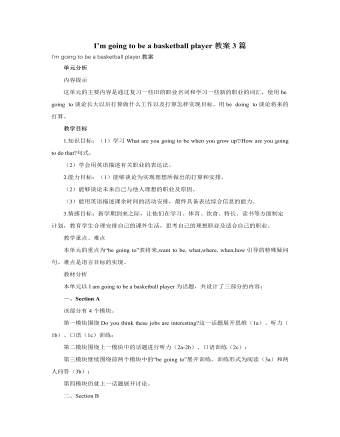
人教版新目标初中英语八年级上册I’m going to be a basketball player教案3篇
教学目标1.知识目标:(1)学习What are you going to be when you grow up?/How are you going to do that?句式。(2)学会用英语描述有关职业的表达法。2.能力目标:(1)能够谈论为实现理想所做出的打算和安排。(2)能够谈论未来自己与他人理想的职业及原因。(3)能用英语描述课余时间的活动安排,最终具备表达综合信息的能力。3.情感目标:新学期到来之际,让他们在学习、体育、饮食、特长、读书等方面制定计划,教育学生合理安排自己的课外生活,思考自己的理想职业及适合自己的职业。教学重点、难点本单元的重点为“be going to”表将来,want to be, what,where, when,how引导的特殊疑问句。难点是语言目标的实现。教材分析本单元以I am going to be a basketball player为话题,共设计了三部分的内容:一、Section A该部分有4个模块。第一模块围绕Do you think these jobs are interesting?这一话题展开思维(1a)、听力(1b)、口语(1c)训练;
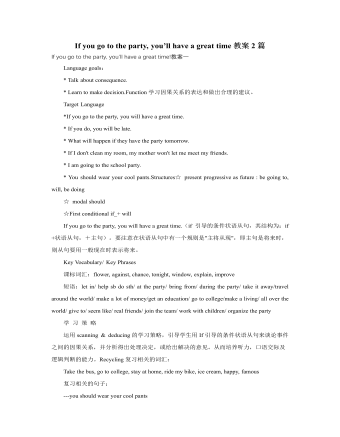
人教版新目标初中英语八年级下册If you go to the party, you’ll have a great time教案2篇
区分宾语从句、定于从句和状语从句宾语从句和状语从句,都叫做主从复合句。宾语从句主要是中考必考的,是初中阶段必掌握的从句,宾语从句主要是掌握三要素,所谓宾语从句,就是宾语在主从复合句当中充当宾语的一个句子,叫做宾语从句。主句的谓语动词是及物动词,后面如果是词或者是短语的话,是简单句,如果是句子的话,肯定是宾语从句。I know that he good at English.就是宾语从句,三要素,一要素是要注意连词,连词一共学了三类连词,一类连词是that口语当中可以省略,就像刚才说的那一句,I hear he is good at English.还有疑问代词、疑问副词,how where when,疑问代词、疑问副词。还有一类连词weather是否的意思,不是状语从句当中的如果,这一定要和如果区分开,这是是否。I don't know if he interested at English。宾语从句要注意if是连词。第二要素是语序,要用陈述举语序。比如说你家有几口人,我们都说How many people are there in you family?但是这是简单句,一旦说成宾语从句,你可以告诉我你家有几口人吗?Could you tell me how many people there are in you family ?
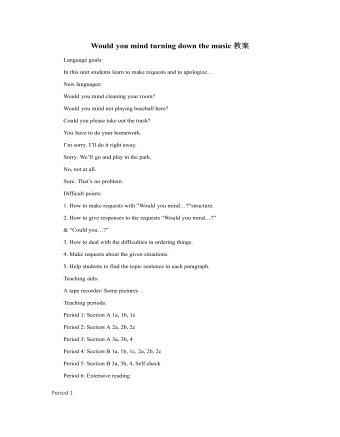
人教版新目标初中英语八年级下册Would you mind turning down the music教案
Step 4. Group work (4)1. Ask a pair of students to read the dialogue. Say, This activity provides speaking, listening and writing practice using the target language.2. Ask students to complete the work in groups.3. Check the answers with the whole class. 4. Explain some of the language points. Step 5. Word review (Self check 1)1. Ask students to read the words and the phrases given. 2. Fill in the blanks with proper forms of these words to complete the sentences. 3. Check the answers with the whole class. Homework:Do activity 2 on page 57 after class. Period 6Teaching aims: 1. Teach vocabulary words and the useful expressions. 2. Enable the students to learn etiquette in different culture. 3. Help the students learn how to behave politely in public places and in daily life. Teaching procedures:Step 1. RevisionHelp students to review the function of making requests through a free talk. Then lead them to the topic of etiquette. Explain the meaning of etiquette. Or, ask students to look it up in the dictionary. Step 2. Pre-reading (Section 1)1. Ask students to read the picture and make a list with their partner about how many rules of etiquette can be seen being broken.
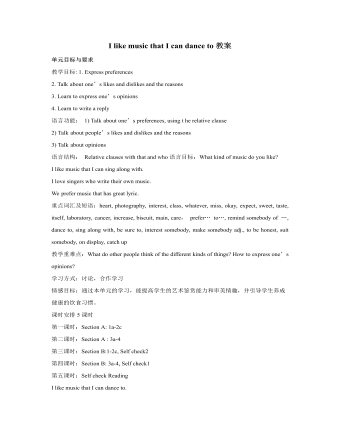
人教版新目标初中英语九年级上册I like music that I can dance to教案
教学目标: 1. Express preferences2. Talk about one’s likes and dislikes and the reasons3. Learn to express one’s opinions 4. Learn to write a reply 语言功能: 1) Talk about one’s preferences, using t he relative clause2) Talk about people’s likes and dislikes and the reasons3) Talk about opinions语言结构: Relative clauses with that and who语言目标:What kind of music do you like?I like music that I can sing along with.I love singers who write their own music.We prefer music that has great lyric.重点词汇及短语:heart, photography, interest, class, whatever, miss, okay, expect, sweet, taste, itself, laboratory, cancer, increase, biscuit, main, care, prefer… to…, remind somebody of …, dance to, sing along with, be sure to, interest somebody, make somebody adj., to be honest, suit somebody, on display, catch up教学重难点:What do other people think of the different kinds of things? How to express one’s opinions? 学习方式:讨论,合作学习情感目标:通过本单元的学习,能提高学生的艺术鉴赏能力和审美情趣,并引导学生养成健康的饮食习惯。课时安排5课时第一课时:Section A: 1a-2c第二课时:Section A : 3a-4第三课时:Section B:1-2c, Self check2第四课时:Section B: 3a-4, Self check1第五课时:Self check ReadingI like music that I can dance to.

